NSG6420 (NSG6420)
South University
Page 2 out of 20 results
Sort by
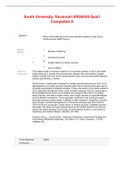
-
NSG6420 Quiz1 Completed A completed ; Answers provided
- Exam (elaborations) • 17 pages • 2022
-
- $13.50
- + learn more
NSG6420 Quiz1 Completed A completed ; Answers provided South University, Savannah NSG6420 Quiz1 Completed A . Question : Which of the following is the most important question to ask during cardiovascular health history? Student Answer: Number of offspring Last physical exam Sudden death of a family member Use of caffeine Instructor Explanation: The sudden death of a family member is an important question to ask in the health history because it reveals the cardiovascular disease r...
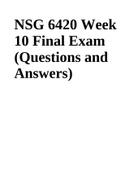
-
NSG6420 Quiz 1 2022 | NSG6420 QUIZ 2 | NSG 6420 QUIZ 3 (Q & A) | NSG 6420 WEEK 2 QUIZ | NSG 6420 Week 5 Midterm Exam | NSG 6420 Week 10 Final Exam & NSG6420 Adult Geriatrics Test Questions (All Answers Correct) - South University.
- Package deal • 9 items • 2022
-
- $30.49
- + learn more
NSG6420 Quiz 1 2022 | NSG6420 QUIZ 2 | NSG 6420 QUIZ 3 (Q & A) | NSG 6420 WEEK 2 QUIZ | NSG 6420 Week 5 Midterm Exam | NSG 6420 Week 10 Final Exam & NSG6420 Adult Geriatrics Test Questions (All Answers Correct) - South University.
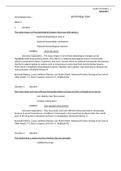
-
Exam (elaborations) NSG 6420-Adult-Geriatrics Test Questions and Answers with Rationales TEST BANK | Kennedy Malone: Advanced Practice Nursing in the Care of Older Adults | Complete Solution Guide | South University Question : The major impact of the phys
- Exam (elaborations) • 157 pages • 2022
-
- $14.99
- + learn more
Exam (elaborations) NSG 6420-Adult-Geriatrics Test Questions and Answers with Rationales TEST BANK | Kennedy Malone: Advanced Practice Nursing in the Care of Older Adults | Complete Solution Guide | South University Question : The major impact of the physiological changes that occur with aging is: Student Answer: Reduced physiological reserve Reduced homeostatic mechanisms Impai red immunological response All of the above Instructor Explanation: The major impact of all of these physiological c...

-
NSG 6420-Adult-Geriatrics Test Questions and Answers with Rationales TEST BANK | Kennedy Malone: Advanced Practice Nursing in the Care of Older Adults | Complete Solution Guide | South University
- Exam (elaborations) • 158 pages • 2021
- Available in package deal
-
- $18.49
- + learn more
NSG 6420-Adult-Geriatrics Test Questions and Answers with Rationales TEST BANK | Kennedy Malone: Advanced Practice Nursing in the Care of Older Adults | Complete Solution Guide | South University The major impact of the physiological changes that occur with aging is: Men have faster and more efficient biotransformation of drugs and this is thought to be due to: The cytochrome p system involves enzymes that are generally:
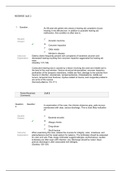
-
SOUTH UNIVERSITY-NSG 6420 WEEK 2 EXAM,MIDTERM EXAMs&FINAL EXAM LATEST UPDATE.GRADED
- Package deal • 5 items • 2020
-
- $24.49
- 1x sold
- + learn more
South University| 6420 FINAL EXAM – QUESTION AND ANSWERS EXAM NSG 6420|SOUTH UNIVERSITY GRADED A FOR NSG 6420 MIDTERM EXAM 1 NSG 6420|SOUTH UNIVERSITY NSG 6420 MIDTERM EXAM LATEST UPDATE.100% GRADED A NSG 6420|South University NSG 6420 Midterm Exam with VERIFIED Answers NSG 6420|SOUTH UNIVERSITY-NSG 6420 Week 2 Quiz
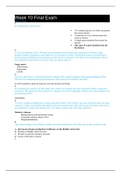
-
NSG 6420 FINAL EXAM – QUESTION AND ANSWERS
- Exam (elaborations) • 16 pages • 2020
- Available in package deal
-
- $18.99
- + learn more
NSG 6420 Final Exam Week 10 – Question and Answers 1.In AR disorders, carriers have: A 76-year-old patient with a 200-pack year smoking history presents with complaints of chronic cough, dyspnea, fatigue, hemoptysis, and weight loss over the past 2 months. The physical exam reveals decreased breath sounds and dullness to percussion over the left lower lung field. The chest X-ray demonstrates shift of the mediastinum and trachea to the left. These are classic signs of: The nurse practitioner i...

How much did you already spend on Stuvia? Imagine there are plenty more of you out there paying for study notes, but this time YOU are the seller. Ka-ching! Discover all about earning on Stuvia


